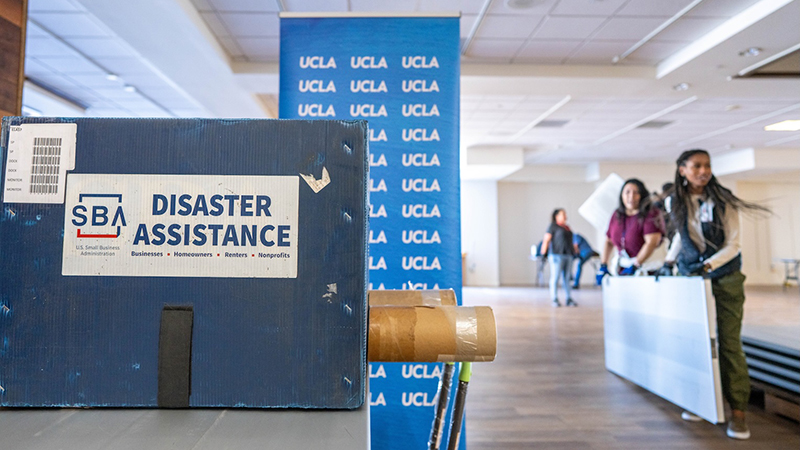Resources and volunteers can make a big impact during climate disasters
Share This Article

Together, the health care sector can support communities devastated by the wildfires — like training providers on recognizing and treating conditions exacerbated by wildfire smoke — while also preparing for future climate events.
Leaders from the UC Center for Climate Health and Equity (UCCHE) recently collaborated on an informative article that provides a blueprint for those interested in giving back: UCCE Founding Co-Directors Arianne Teherani, Ph.D., and Sheri Weiser, M.D., M.P.H., along with UCCE Pillar Research Co-Chair Tarik Benmarhnia, Ph.D.
How the health care sector can support Los Angeles amid the wildfires
By Arianne Teherani, Sheri Weiser and Tarik Benmarhnia
Taking action on and adapting to climate change are among the most powerful health interventions of our time. The health care sector can generate and uplift climate solutions that foster healthy and equitable communities and a healthier planet for future generations. More health systems and individual doctors should get involved in these efforts.
Our beautiful state of California is facing a severe wildfire crisis that has brought widespread devastation and heartache to many communities in Southern California.
First and foremost, we are sending peace and strength to those who have been directly affected. The loss of homes, the displacement of families and communities, and the impact on our natural environment are truly heartbreaking. We stand in solidarity with all who are impacted, including the dedicated response and recovery teams that have been tirelessly working to extinguish the fires and provide critical support to those in need.
Here are some immediate steps that we in the health care and health science communities can take to support those affected. These actions are important now — but they will also serve patients and communities in the climate disasters sure to come.
Be a broker of information
Distribute educational materials about the health risks associated with wildfire smoke and ash, as well as resources on how to protect oneself and others from wildfire smoke (before, during, and after the events). This is especially important for vulnerable groups like the elderly, children, pregnant women, and individuals with pre-existing physical and mental health conditions.
You can advocate for and help set up clean air shelters or safe zones equipped with air purifiers and HVAC systems that filter out smoke particles. While the immediate need is in Los Angeles, these shelters may be important in any fire-prone community.
Also consider advocating for and helping to ensure the availability of personal protective equipment, such as N95 or KN95 masks, for both health care workers and the general public during wildfire events.
Mental health should not be placed on the back-burner during climate events. Share available resources, including mental health support, with those who have lost their home or business to the wildfires, or those who may experience severe stress or anxiety related to these events.
Patient care and support of disproportionately impacted groups
Expand health system telehealth services to provide medical and mental health consultations during and after wildfire events when air quality is poor, where there is a lot of ash or debris, or if travel may be hazardous. Many health care systems, including ours, are working to coordinate with groups of therapists and with some local clinics in the LA region to ensure continued care. Check in on health system websites to stay up to date on volunteer opportunities.
Ensure that health care providers are trained in recognizing and treating conditions exacerbated by wildfire smoke, such as asthma and chronic obstructive pulmonary disease.
Inform patients — especially those with respiratory or cardiovascular conditions — about the specific risks they face and protective measures they should take during wildfire events. Also, be sure to identify and provide additional support to disproportionately impacted populations.
Volunteer
If you are able to do so, volunteering with local relief organizations can provide much-needed assistance to those in need. Local needs are regularly updated on the We Are L.A. Fire Resource Page and the MALAN Fire & Wind Storm Resources page.
It’s important to remember that wildfires are exacerbated by the climate crisis. We must continue our efforts to combat climate change by advocating for sustainable policies and practices. Support legislation that aims to reduce greenhouse gas emissions and promote renewable energy. Conduct and support research on the health impacts of wildfire smoke and effective mitigation strategies. Push for increased funding for climate emergency preparedness and public health infrastructure.
We remain committed to addressing the intersection of climate change and health. We will continue to work tirelessly to promote policies, research, and initiatives that protect both our environment and the health of our communities. We hope that together, we can navigate these difficult times and build a more resilient future.
Editor’s note: This article was originally published by MedPage Today.
